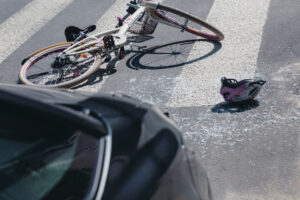I have been a bicyclist for as long as I can remember. I will never tire of the euphoric feeling of going out for a great ride on a sunny weekend day. However, I will also never forget the fright associated with the feeling of almost getting hit by a car who passed me dangerously close. Whether on a rural road or city street, it is not ok for a cyclist to be so vulnerable against passing cars. It goes without saying that when a motorist makes contact with a cyclist, the cyclist loses.
I was happy to learn of a new bill that offered stronger protection from bicycle accidents: provision SB 910 which was to add to section 21750.1 of the California Vehicle Code. It is otherwise known as the "3 feet and 15mph law." The provision would require the driver of a motor vehicle overtaking a bicycle proceeding in the same direction to pass to the left at a safe distance, at a minimum clearance of three feet, at a speed not exceeding 15 miles per hour faster than the speed of the bicycle, without interfering with the safe operation of the overtaken bicycle.
However, I learned that Friday, October 7, 2011, Governor Brown vetoed the bill, siding with CHP and Caltrans by stating:
The intent of this bill is to improve bicycle safety, a goal I wholeheartedly support. This bill changes the longstanding law for how motor vehicles should pass a bicycle traveling in the same direction. Current law requires drivers to pass at a safe distance; this bill would specify that the distance must be at least 3 feet or at a speed not exceeding 15mph.
Caltrans and CHP have raised legitimate concerns about other provisions such as the 15mph requirement. On streets with speed limits of 35 or 40mph, slowing to 15 mph to pass a bicycle could cause real end collisions. On other roads, a bicycle may travel at or near 15mph creating a long line of cars behind the cyclist.
I encourage the author, prononents, and opponents to send me a bill next year that solves these problems. I am returning SB 910 without my signature.
I was hoping that we could give cyclists a stance against reporting close car passing, so that it’s taken seriously by the police as law. With the proposed safe passing law, cyclists would have a stronger case for liability. More importantly, this may prove to open the eyes of some motorists who are normally too careless to believe this is an issue.
Even though Governor Brown vetoed the bill, the bill is, in fact, back on his desk for reconsideration.
Too many Californians avoid riding their bikes because they feel uncomfortable about trying to share the road with motor vehicles, especially when they see cars and trucks pass bicyclists too closely. It is unfortunate because these cyclists have the right to enjoy the health, environmental and economic benefits of riding a bicycle for transportation or recreation. Their discomfort is now being heard.
The safe passing law would minimize a leading cause of deadly collisions. I too believe that a specified passing distance provides drivers with a more objective and easily understood measure of what constitutes “safe” and gives law enforcement and the courts a more objective basis for enforcing California’s safe passing requirement. Moreover, it helps emphasize a driver’s special responsibility to safeguard more vulnerable road users like bicyclists.
About the author: Claude Wyle is an aggressive advocate for Bay Area bicyclists. Claude has decades of experience representing those harmed by the wrongful conduct of other, and, as a Marin County bicyclist accident attorney, has fought to protect the rights of injured cyclists throughout his legal career. Claude is also an avid cyclist himself and member of the Marin County Bicycle Coalition, San Francisco Bicycle Coalition and Silicon Valley Bicycle Coalition and is a sponsor of Safe Routes to School.

Claude A. Wyle is a partner of Choulos Choulos, and Wyle, a San Francisco based law firm dedicated to representing clients who have been injured by the wrongful conduct of individuals, corporations, public entities, and businesses. Mr. Wyle also frequently sits as a Judge Pro Tem for the city and county of San Francisco.










Comments for this article are closed.